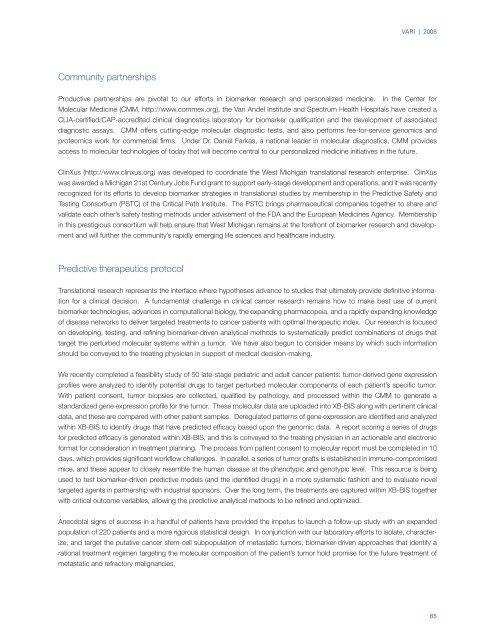2008 Scientific Report
Create successful ePaper yourself
Turn your PDF publications into a flip-book with our unique Google optimized e-Paper software.
VARI | <strong>2008</strong><br />
Community partnerships<br />
Productive partnerships are pivotal to our efforts in biomarker research and personalized medicine. In the Center for<br />
Molecular Medicine (CMM, http://www.commex.org), the Van Andel Institute and Spectrum Health Hospitals have created a<br />
CLIA-certified/CAP-accredited clinical diagnostics laboratory for biomarker qualification and the development of associated<br />
diagnostic assays. CMM offers cutting-edge molecular diagnostic tests, and also performs fee-for-service genomics and<br />
proteomics work for commercial firms. Under Dr. Daniel Farkas, a national leader in molecular diagnostics, CMM provides<br />
access to molecular technologies of today that will become central to our personalized medicine initiatives in the future.<br />
ClinXus (http://www.clinxus.org) was developed to coordinate the West Michigan translational research enterprise. ClinXus<br />
was awarded a Michigan 21st Century Jobs Fund grant to support early-stage development and operations, and it was recently<br />
recognized for its efforts to develop biomarker strategies in translational studies by membership in the Predictive Safety and<br />
Testing Consortium (PSTC) of the Critical Path Institute. The PSTC brings pharmaceutical companies together to share and<br />
validate each other’s safety testing methods under advisement of the FDA and the European Medicines Agency. Membership<br />
in this prestigious consortium will help ensure that West Michigan remains at the forefront of biomarker research and development<br />
and will further the community’s rapidly emerging life sciences and healthcare industry.<br />
Predictive therapeutics protocol<br />
Translational research represents the interface where hypotheses advance to studies that ultimately provide definitive information<br />
for a clinical decision. A fundamental challenge in clinical cancer research remains how to make best use of current<br />
biomarker technologies, advances in computational biology, the expanding pharmacopeia, and a rapidly expanding knowledge<br />
of disease networks to deliver targeted treatments to cancer patients with optimal therapeutic index. Our research is focused<br />
on developing, testing, and refining biomarker-driven analytical methods to systematically predict combinations of drugs that<br />
target the perturbed molecular systems within a tumor. We have also begun to consider means by which such information<br />
should be conveyed to the treating physician in support of medical decision-making.<br />
We recently completed a feasibility study of 50 late-stage pediatric and adult cancer patients: tumor-derived gene expression<br />
profiles were analyzed to identify potential drugs to target perturbed molecular components of each patient’s specific tumor.<br />
With patient consent, tumor biopsies are collected, qualified by pathology, and processed within the CMM to generate a<br />
standardized gene expression profile for the tumor. These molecular data are uploaded into XB-BIS along with pertinent clinical<br />
data, and these are compared with other patient samples. Deregulated patterns of gene expression are identified and analyzed<br />
within XB-BIS to identify drugs that have predicted efficacy based upon the genomic data. A report scoring a series of drugs<br />
for predicted efficacy is generated within XB-BIS, and this is conveyed to the treating physician in an actionable and electronic<br />
format for consideration in treatment planning. The process from patient consent to molecular report must be completed in 10<br />
days, which provides significant workflow challenges. In parallel, a series of tumor grafts is established in immune-compromised<br />
mice, and these appear to closely resemble the human disease at the phenotypic and genotypic level. This resource is being<br />
used to test biomarker-driven predictive models (and the identified drugs) in a more systematic fashion and to evaluate novel<br />
targeted agents in partnership with industrial sponsors. Over the long term, the treatments are captured within XB-BIS together<br />
with critical outcome variables, allowing the predictive analytical methods to be refined and optimized.<br />
Anecdotal signs of success in a handful of patients have provided the impetus to launch a follow-up study with an expanded<br />
population of 220 patients and a more rigorous statistical design. In conjunction with our laboratory efforts to isolate, characterize,<br />
and target the putative cancer stem-cell subpopulation of metastatic tumors, biomarker-driven approaches that identify a<br />
rational treatment regimen targeting the molecular composition of the patient’s tumor hold promise for the future treatment of<br />
metastatic and refractory malignancies.<br />
65

















